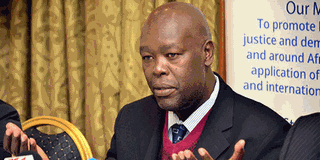Prioritise access to justice for GBV victims, Judiciary told

International Commission of Jurists (ICJ) Chairman Kelvin Mogeni addressing the media at a past event.
The Judiciary has been urged to prioritise access to justice for victims of sexual and gender-based violence as well as persons in detention facilities even as the justice system adapts to the effects of the coronavirus pandemic.
In a communique to the media on Thursday, the Kenyan Section of the International Commission of Jurists (ICJ Kenya) noted that the Judiciary should ensure that access to justice to the vulnerable remains at the centre of all interventions during the ongoing pandemic.
With spreading infections across the country, law courts were forced to temporarily close as people were encouraged to work from home. Some courts resolved to conduct ‘virtual hearings’ while others conducted ‘outside hearings’ in a bid to reduce the number of pilling cases.
USE TECHNOLOGY
In the communique, Commission Chair Kelvin Mogeni stated that there has been growing concern over the limited availability of infrastructure in courts across the country to use technology in the administration of justice, further noting that justice can only be achieved through collaboration of all actors.
“We are concerned by the limited access to technology by Wanjiku to engage with online justice platforms, despite the increase in cases affecting the poor and vulnerable populations such as women, children and persons in detention and confinement facilities,” he noted.
The communique follows a series of webinars by ICJ Kenya which focused on how adjustments in the Judiciary necessitated by Covid-19 have affected the right to access to justice for the ordinary citizen.
Mr Mogeni noted that there is need to seek alternatives to technology, which is not widely available to a majority of vulnerable Kenyans.
“We note that a large percentage of Kenyans seek justice in other justice mechanisms aside from the courts, and thus the need to consider these mechanisms when discussing justice for Wanjiku,” he added.
In the past two months, there has been worrying reports of increased sexual and gender-based violence that has been attributed to job losses and curfew restrictions due to Covid-19.
INSUFFICIENT RESOURCES
“We recognise the efforts of the legal fraternity and civil society in providing free legal aid for the poor and vulnerable whose rights have been threatened, abrogated or violated. However, the Judiciary should prioritise access to justice for the poor and vulnerable, including victims of sexual and gender-based violence,” said Mr Mogeni.
Mogeni noted that the court’s resort to online hearings has raised concern of access to justice for part of the population who may lack internet connectivity.
“Digitisation of court processes has increased the speed of some cases such as commercial and appeal cases, however, others such as land succession and family matters have delayed. Thus, there is need to promote other justice mechanisms in ensuring they comply with the standards set and that the rights of the vulnerable are safe guarded,” he added.
The Commission expressed concern that the justice system has been struggling with insufficient resources to carry out justice during the pandemic, urging the executive to intervene.
“We are calling upon the executive to provide sufficient resources to enable the judiciary set up the necessary infrastructure to facilitate digitisation of the judicial system both on responding to Covid-19 and in the long term,” he noted.





